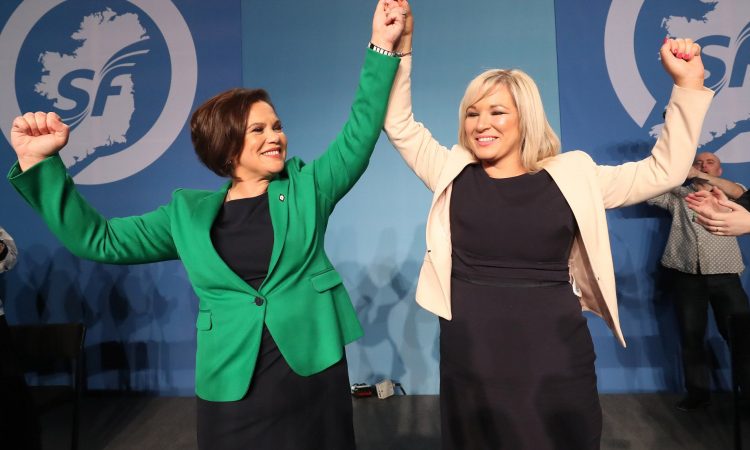Brexit sparked widespread protests in the breakaway regions of the country, including Scotland and Northern Ireland. In Northern Ireland, Catholics want unity with the Republic of Ireland. With the victory of the pro-unity and left-wing Sinn Fein party in the Irish parliamentary elections, their motivation for the unification of the two Ireland has doubled. Sinn Fein’s success may put some in the North against the Conservatives, and Brexit may even have a negligible effect. Many British politicians are concerned that Sinn Fein’s success could be tantamount to administrative trouble, violence, or the secession of Ireland from the British monarchy. However, mobility seems unstoppable for a united Ireland faster than most people expect.
Rise of Sinn Fein
Fine Gael and Fianna Fáil exchanged power in Ireland for more than a century, but the two polarities broke down when Sinn Fein came out on top in the Irish general election. Sinn Fein had ties to the IRA and won the election with leftist leanings such as spending heavily on health and housing and raising taxes on wealthy people. However, it did not hide its main political ambition, which is very ambitious; “Achieving the unity of Ireland and holding a referendum on this unity is the means to this end.” Scotland’s independence has been significant since Brexit, but it is time to consider the possibility of a different secession from Britain. Sinn Fein’s victory in the election is the last reason a united Ireland has struggled with a reality for a decade or more.
Polls speak louder
The latest poll carried out by the Sunday Independent / Ireland Thinks Sinn Fein established itself as the most popular party in the country at the expense of coalition parties. The poll shows Sinn Féin’s latest monthly vote with 33%, up to two points from its position a month ago, making it the most popular party in the state.
Fine Gael is in second place with 22 per cent, an increase of one point in March, while Fianna Fáil is down 18 per cent with three points in the March poll (down two). The Green Party has dropped three percentage points.
Sinn Fein leader overtaking.
The total decline in support for coalition parties is likely to reflect its problems with the maze of living costs and the massive increase in home energy costs, which has angered consumers. Sinn Féin has repeatedly been raising the cost-of-living issue in the Dáil and across the airwaves urging the Government to introduce a mini-budget with measures that would cost €1.4 billion. The party’s leader Mary Lou McDonald has also overtaken Tánaiste Leo Varadkar in the leadership approval ratings.
Ms McDonald’s approval rating has risen by 0.1 to 4.1 out of 10 among voters, while Mr Varadkar, the Fine Gael leader, has seen his approval rating slide back by 0.2 to 3.8 out of 10.
Taoiseach Micheál Martin remains the most popular of the four foremost party leaders with an approval rating of 4.3 out of 10, although this represents a fall of 0.4 on his result in March. Green Party leader Eamon is unchanged on 2.1 out of 10.
Meanwhile, Ivana Bacik, the new leader of the Labour Party, will be encouraged by the increase in support for her party, which has increased by one point to 4%.
From the rich to the working class
For decades, conservative parties such as the Fianna Fail or Finn Gael have dominated, with small parties like the Greens and Labour. For the first time, Sinn Fein ran in the election as a left-wing alternative party, a party that focuses on the people and the people’s interests. Fianna Fail and Fine Gael defend the interests of the rich, and Sinn Fein supports the interests of the working class, and the people understand that.
For decades, state radio and television interviews with representatives of the Sinn Fein, or IRA, were banned in the Republic of Ireland, and just ten years ago, Sinn Fein redefined its goals. Party leaders believe, “We do not want to say that Sinn Fein became more professional, but it was able to instil these goals better”. In this context, it was essential to focus on social issues. They make it clear that rent should not increase. Everyone must pay the rent for one month at the end of the year.
Leaders’ goals while in power
Sinn Fein leaders make it clear in their program that they know what to do if they take a position. The previous ministers were unprepared when they arrived at the ministry and had to follow the advice of government employees, so there was no change in the situation. Sinn Fein leaders say, “we have to know what we would do and what changes we would make in the government”. We hope to become the most muscular power and see who will support our progressive program.
Housing for all
Sinn Fein believes that Government should build 20,000 social housing units annually. Many people come to Sinn Fein every day and boast that they can no longer pay their rent. The number of houses with showers is very high. The other two pillars are the improvement of hospitals and kindergartens.
The covid pandemic made people realise that it was madness that they did not work together as citizens of an integrated Island or a united country. The unity of the two countries is genuine, and the Government must prepare for a referendum now. People like the “unionists” will oppose it. This mistake should not be repeated like the founding of a country where the Protestants and Unionists were forgotten, and a Catholic state was established. The new Government must be vast and include everyone.
Brexit outcome
Brexit is one of the reasons why all equations have changed. Northern Ireland voted against it, but the largest Union party and Britain voted in favour of it. The Nationalists were not the only ones outraged by Prime Minister Johnson over the South’s threat of food shortages to soften the stakes in the negotiations. Brexit also creates an economic maritime border between Northern Ireland and the United Kingdom in the Irish Sea. Although trade with the South will become more complex, dealing with Britain will be more straightforward. In this way, the six northern countries are affected more than what is happening in Dublin.
Will unity happen?
The pressures for unity are more significant than when the UK Government raised the issue of Brexit. The Republic has also been more welcomed. The influence of the Catholic Church has disappeared dramatically, and society has become more accessible. Over the past three decades, contraceptive restrictions have been lifted and gay marriage legalised. This explains why support for the union in Northern Ireland seems to have increased in recent years. Even if the “Good Friday Agreement” reconciles some Catholics to stay in Britain, it still shows how the North can rejoin the Republic peacefully.
Catholics call it the “Good Friday Agreement,” and Protestants call it the “Belfast Agreement.” The first group sees the treaty as a path to independence, and the second group sees it as a document for an alliance with Britain. Despite this treaty, the characteristics of separation among the Irish remain. Protestants living in the Northern Provinces of Ireland have their customs, and the majority of Catholics living in the Southern Provinces have a different outlook on political life.
Conclusion
Sinn Fein’s success may put some in the North against the Conservatives, and Brexit may even have a more negligible effect than expected. Many British politicians are concerned that Sinn Fein’s success could be tantamount to administrative trouble, violence, or the secession of Ireland from the British monarchy.
However, mobility seems unstoppable for a united Ireland faster than most people expect. Many in Northern Ireland will lose their ancestral ties to Britain if Scotland chooses independence. If the Government in Westminster refuses to accept a majority in the Northern Ireland Union, it could be as unstable as calling a referendum. The island of Ireland needs a plan. The priority must be how to give the Unionists a sense of place in New Ireland. This requires working on the nuts and bolts of the alliance, including how the coalition works, the need to integrate the two health systems (one of which is free), the armed forces and police services, and what needs to be done about the unique Northern Assembly.
This will help the Republic have a good track record of citizen-led constitutional consultation that can help shape the picture. Ireland has determined an ally. If the people of the North and the Republic choose this path, the politicians must follow it.





























